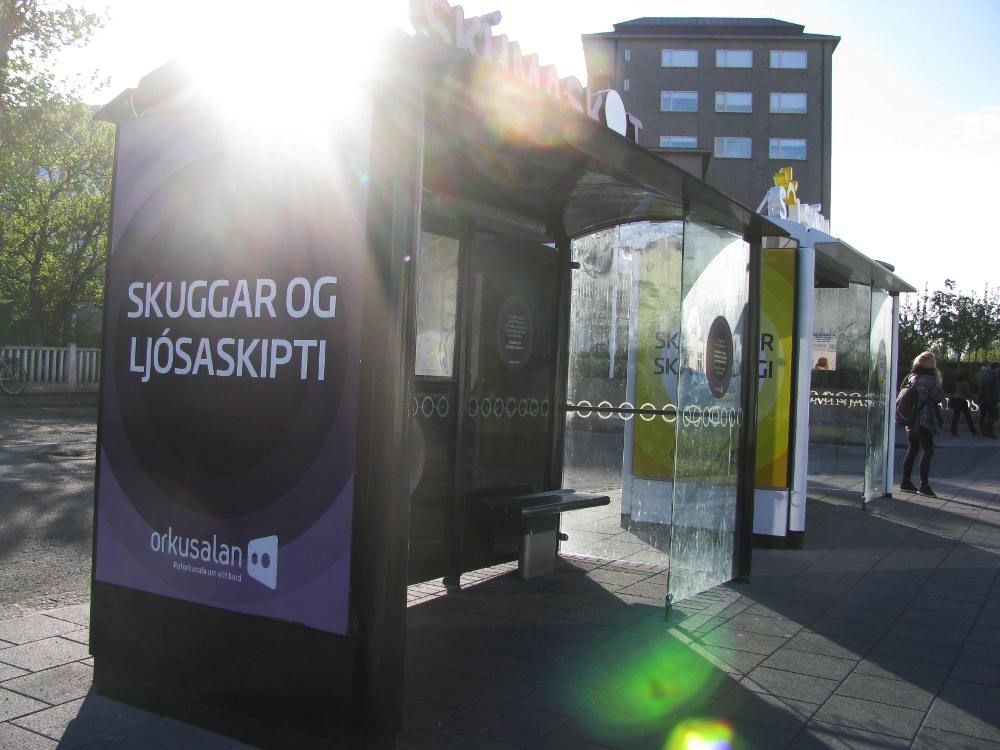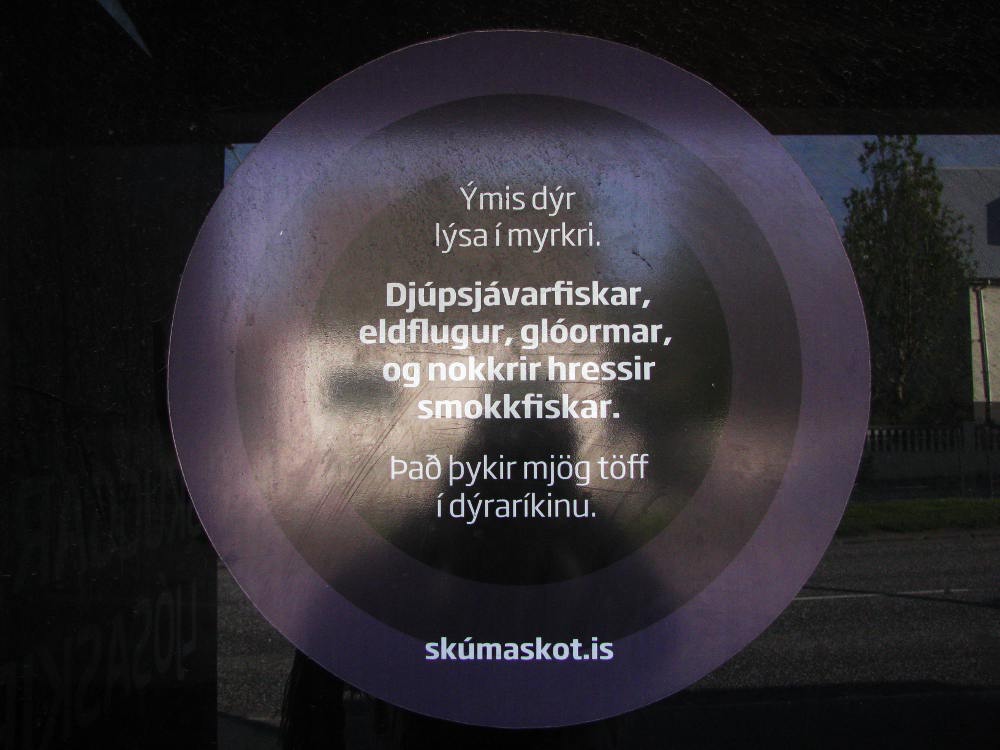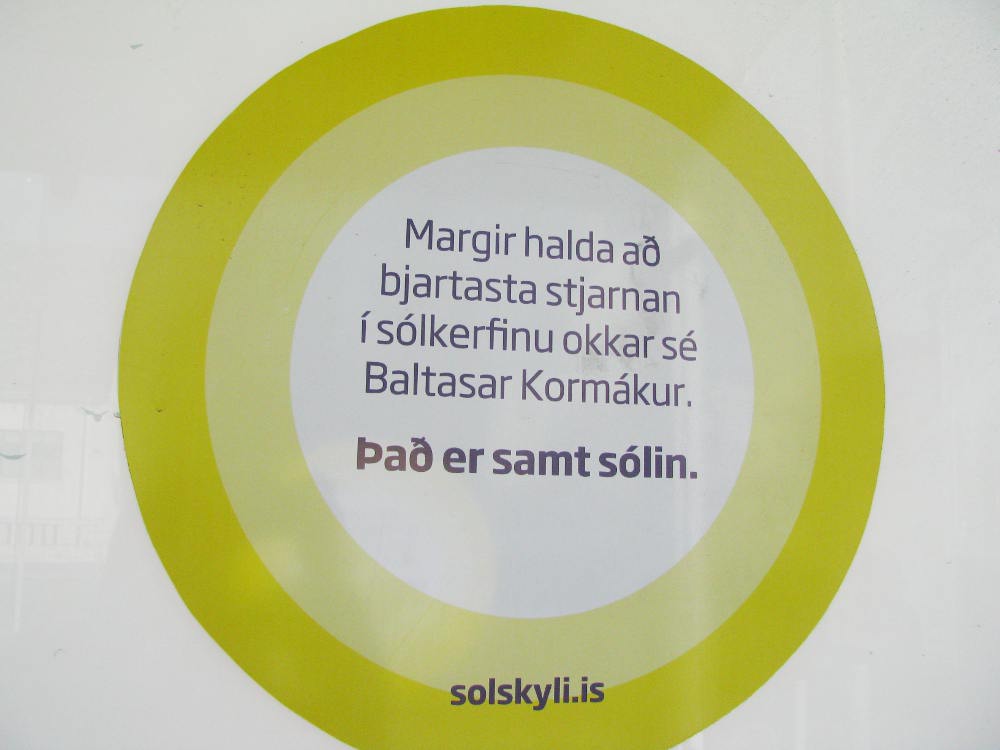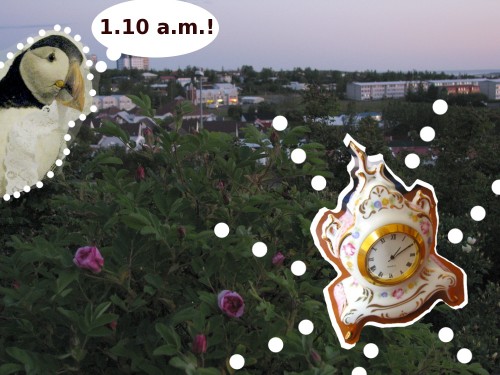Nightless nights, dayless days. Posted by hulda on May 26, 2014 in Icelandic culture, Icelandic customs, Icelandic history
Like A hundred names for snow might show, Icelandic has quite a rich vocabulary when it comes to nature and the seasons. An obvious example besides snow is light and darkness and the change from one to other, because the time during which day and night are about the same length is very, extremely short. Due to the northern location of the country you’ll either get an eternal night or an endless day for the grand majority of the time and there’s very little in between. It may sound impossible but it really does feel like the darkness and light switch places within two weeks.
This seasonal change has marked people’s lives from the very first days when Iceland was settled. There are various names for different kinds of darkness and light, there’s a long list of names both feminine and masculine that include these elements and you’ll have to dig for a long time to find nature poetry that didn’t mention them in any way. This also carries on to other types of art because it’s almost impossible to describe a scene in Iceland without talking about the light, or the lack thereof.
 The bus stop at the University of Iceland often has some kind of a theme going on, the current one being darkness vs. light. Both stops have heaters for the wintertime.
The bus stop at the University of Iceland often has some kind of a theme going on, the current one being darkness vs. light. Both stops have heaters for the wintertime.
Culture-wise the country is divided along similar lines. There’s darkness that holds within secrets, the hidden people, trolls (they cannot move around in daylight lest they turn to stone), magic, zombies and/or ghosts (with the Icelandic ones it’s hard to tell the difference) and so forth; forces that are powerful, mysterious and often, though not always, dangerous. The trolls don’t hunt you for their dinner when its light, nor do the elves look to kill you in creative and painful ways for their amusement – by the way, forget everything you’ve ever heard of Tolkien elves when it comes to the Icelandic variety.
Likewise there’s light that rules over all kinds of pleasant, safe things, heralding warmth and order as opposed to the chaotic nature of the dark. Light can also be used to bargain with the powers of the dark such as the hidden people. There’s are many stories of people who give elf children candles as gifts and receive the parents’ gratitude and, often, elf-made gifts.
 There are many types of darkness. Coal darkness, deep darkness, dark as black and even damn darkness. What’s your favourite darkness?
There are many types of darkness. Coal darkness, deep darkness, dark as black and even damn darkness. What’s your favourite darkness?
It may be a bit confusing at first, but the exact same word may belong to several word groups. For example ljós (= light) can be both a noun and an adjective, and birta (= light) can be both a noun, a verb and a woman’s name. Dimma (= darkness) can be both a verb and a noun, and myrkur (= dark) can be either a noun or an adjective.
There are small nuance differences between these words of course: ljós, though it can mean light in general, is typically used for “artificial” light such as ljósapera (= a light bulb; lit. transl. “light pear”) and though sunlight is a thing, the word used for it in Icelandic is most commonly sólskin. To confuse you a bit further, sólarljós also means the light of sun! Ljós tends to be used in a somewhat clinical sense though, f.ex. a light year is a ljósár and ljóshraði is speed of light.
 Many animals shine in darkness. Deep sea fish, fireflies, glow worms and certain amusing squids (smokkfiskur = squid, but smokkur = condom and fiskur = fish, so it’s entirely possible they’re going for a little pun with the last one :D). It’s considered real awesome in the animal kingdom.
Many animals shine in darkness. Deep sea fish, fireflies, glow worms and certain amusing squids (smokkfiskur = squid, but smokkur = condom and fiskur = fish, so it’s entirely possible they’re going for a little pun with the last one :D). It’s considered real awesome in the animal kingdom.
Besides the former examples, darkness can just be described as ljóslaus (= lacking light, “lightless”). I also find it amusing that a different kind of dark – dark as in uncertain or obscure – is óljós in Icelandic! Remember the suffixes and prefixes?
On the other side of the coin are words that wouldn’t have the word light attached to them in most other languages but for some reason in Icelandic they exist. One such example is ljósmóðir (= midwife), literally “light mother”, a word that the Icelanders have defined as being one of the most beautiful of their language. In old Icelandic can be found a word ljósorður, and though it sounds very much like light-worded it actually means “clear-spoken”. My own personal favourite comes from a bit more recent vocabulary: scanning, that’s called að ljóslesa (= lit. transl. “to light-read”).
 Many think that the brightest star in our solar system is Baltasar Kormákur. It’s actually the sun.
Many think that the brightest star in our solar system is Baltasar Kormákur. It’s actually the sun.
What of the names then: aside of the already mentioned Birta there are countless names that carry a “light” part (and few if any that include “darkness”). Bjartur, literally an adjective that means brightness, is a male name and quite a well-known one as the main character of Independent People by Laxness was Bjartur í Sumarhúsum. The name of his daughter? Ásta Sóllilja, “Beloved Sun-lily”. The sunny names are quite the contrast to the characters’ personalities!
Bjartur has also feminine versions to it such as Bjartmey (= light maiden) and Bjartey (= light island). If you really want to name your girl child with the epitome of light names, Ljósbjört (= light bright) is probably the best option, but no reason is good enough to name your boy child Ljótur. At its origin the name used to mean light but alas, it’s nowadays only translatable as “ugly” and the Icelandic name committee has banned it as a name option because it might be embarrassing for the child. Regardless there is currently at least one Ljótur in Iceland.
 There are day light bulbs installed in this sun shelter that give good and healthy light. We recommend the sun though, whenever she shows herself.
There are day light bulbs installed in this sun shelter that give good and healthy light. We recommend the sun though, whenever she shows herself.
Here’s a short, traditional ghost story featuring f.ex. a typical way of dealing with zombies and many ways of referring to light and darkness – see if you catch them all!
The light/dark theme is ever present in the daily life in Iceland and one could say it gets a little repetitive at times, but can you really blame us when winters are like this and summers are like this?
All photos used in this post are taken by me.

Build vocabulary, practice pronunciation, and more with Transparent Language Online. Available anytime, anywhere, on any device.
About the Author: hulda
Hi, I'm Hulda, originally Finnish but now living in the suburbs of Reykjavík. I'm here to help you in any way I can if you're considering learning Icelandic. Nice to meet you!




